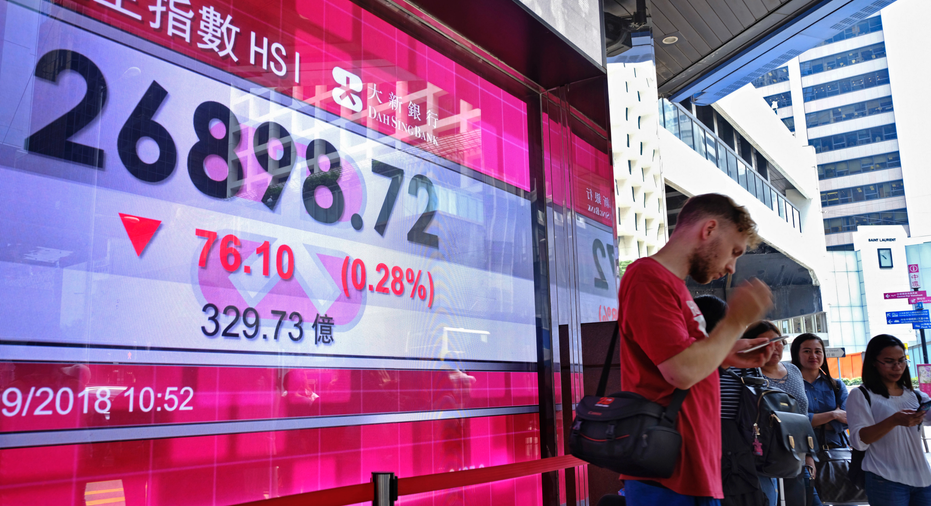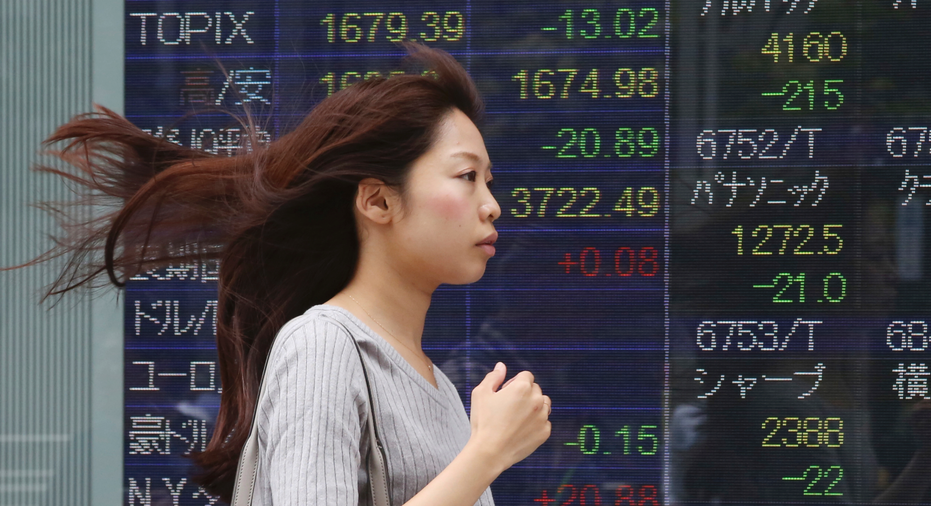World stocks mostly fall on possible US-China tariffs
A man walks past an electronic board showing Hong Kong share index outside a local bank in Hong Kong, Friday, Sept. 7, 2018. Asian stocks were mostly lower on Thursday as the U.S. and China moved closer to imposing tariffs on billions of dollars of each other's goods, sounding a call of caution in the markets. (AP Photo/Vincent Yu)
SINGAPORE – Global stock markets mostly fell on Friday as traders mulled over the effects of possible U.S. tariffs on $200 billion in Chinese goods and looked ahead to U.S. jobs data.
KEEPING SCORE: In Europe, France's CAC 40 fell 0.3 percent to 5,230, while the FTSE 100 index of leading British shares gave up 1 percent to 7,249. Germany's DAX fell 0.3 percent to 11,927, after the country's trade surplus dipped to four-year low. U.S. indexes are set for a subdued open. Dow futures dropped 0.2 percent and the broader S&P 500's futures shed 0.1 percent.
ASIA'S DAY: Japan's benchmark Nikkei 225 fell 0.8 percent to 22,307.06 and the Kospi in South Korea dropped 0.3 percent to 2,281.58. Hong Kong's Hang Seng index, which has dropped 18 percent since its peak in late January, was almost flat at 26,973.47. The Shanghai Composite index was 0.4 percent higher at 2,702.30. Australia's S&P/ASX 200 shed 0.3 percent to 6,143.80. Shares were lower in Taiwan and most of Southeast Asia.
US-CHINA TENSIONS: The Trump administration may impose tariffs of up to 25 percent on an additional $200 billion in Chinese goods, after a public comment period ended Thursday. The imports are equal to nearly 40 percent of all the goods China sold the U.S. last year. Doing so would escalate a confrontation between the world's two biggest economies and likely squeeze U.S. companies that import everything from handbags to bicycle tires. China has said that it is ready to retaliate with "necessary countermeasures" if President Donald Trump goes ahead with the tariff hike. Commerce Ministry spokesman Gao Feng said Thursday that the country is confident it can maintain "steady and healthy" economic growth. It has announced a $60 billion list of American products targeted for retaliation. The Chinese government has said it would help local and even foreign businesses in the country mitigate the effects of the trade dispute.
ANALYST'S TAKE: "The market is risk-off and pricing in the effects of new tariffs. It's a done deal as far as investors are concerned," said Francis Tan, investment strategist at UOB Private Bank. "I don't think that China will retaliate with a full-fletched devaluation of the yuan. They will turn to other non-tariff measures," he added.
DATA OUTLOOK: Investors are expecting a string of U.S. releases on Friday, such as the latest unemployment rate. Economists have forecast that employers added 189,000 jobs in August and that the unemployment rate dipped from an already-low 3.9 percent to 3.8 percent. In the coming week, the markets will also be looking out for Chinese data, including the country's year-on-year foreign direct investment and industrial output. Next week's Bank of England and European Central Bank meetings could also affect sentiment.
ENERGY: Benchmark U.S. crude added 12 cents to $67.89 a barrel. The contract dropped 1.4 percent to settle at $67.77 a barrel in New York. Brent crude, used to price international oils, gained 19 cents to $76.69 a barrel. It lost 1 percent to $76.50 a barrel in London on Thursday.
CURRENCIES: The dollar edged up to 110.85 yen from 110.83 yen. The euro strengthened to $1.1611 from $1.1625.





















